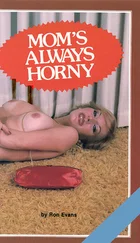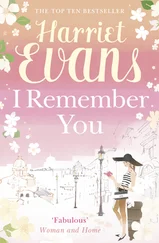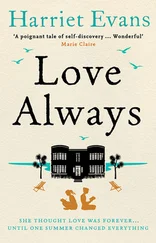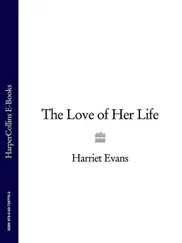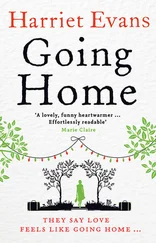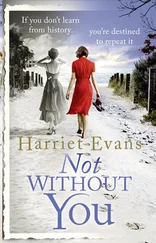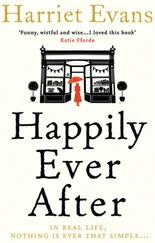Harriet Evans - Love Always
Здесь есть возможность читать онлайн «Harriet Evans - Love Always» — ознакомительный отрывок электронной книги совершенно бесплатно, а после прочтения отрывка купить полную версию. В некоторых случаях можно слушать аудио, скачать через торрент в формате fb2 и присутствует краткое содержание. Жанр: Старинная литература, на английском языке. Описание произведения, (предисловие) а так же отзывы посетителей доступны на портале библиотеки ЛибКат.
- Название:Love Always
- Автор:
- Жанр:
- Год:неизвестен
- ISBN:нет данных
- Рейтинг книги:3 / 5. Голосов: 1
-
Избранное:Добавить в избранное
- Отзывы:
-
Ваша оценка:
- 60
- 1
- 2
- 3
- 4
- 5
Love Always: краткое содержание, описание и аннотация
Предлагаем к чтению аннотацию, описание, краткое содержание или предисловие (зависит от того, что написал сам автор книги «Love Always»). Если вы не нашли необходимую информацию о книге — напишите в комментариях, мы постараемся отыскать её.
Love Always — читать онлайн ознакомительный отрывок
Ниже представлен текст книги, разбитый по страницам. Система сохранения места последней прочитанной страницы, позволяет с удобством читать онлайн бесплатно книгу «Love Always», без необходимости каждый раз заново искать на чём Вы остановились. Поставьте закладку, и сможете в любой момент перейти на страницу, на которой закончили чтение.
Интервал:
Закладка:
This is the train I took every summer, with Mum, to Summercove. Mum would bring me down, stay for a few days and then leave before the rest of her relatives arrived, and sometimes – but not often – before she and Granny could row about something: money, men, me.
It was always so much fun, the train down to Penzance when I was little. It was the anticipation of the holiday ahead, six weeks in Cornwal , six weeks with my favourite people in my favourite place. Mum would be in a strangely good mood on the train down, and so would I, both of us looking forward to diluting our twosome for a few weeks, away from our dark Hammersmith mansion flat, where the wal paper peeled away from the wal s, and in the summer the smel from the bins outside was noticeable. Bryant Court didn’t suit summer. The noises inside and out got worse, scratching and strange, and the cast of characters in the building seemed to get less eccentric and more menacing. The hot weather seemed to dry them out, to make them more brittle and screeching. We were always euphoric to be out of there, away from it al .
Once, when we were on our way to Paddington and my mother was dragging me by the wrist towards a waiting cab, bags slung over our shoulders, Mrs Pogorzelski hissed, ‘Slut!’ at Mum, as she opened the door. I didn’t know what it meant, or why she was saying it. Mum bundled me into the black cab and we sat there grinning, surrounded by luggage, as we rol ed up through Kensington towards the station, both of us complicit in some way that I couldn’t define. That was also one of the times Mum forgot her purse, and the cab driver let us have a ride for free after she cried.
She forgot her purse quite often, my mother.
She is at Summercove already, helping Cousin Louisa sort out the funeral and the house. She is convinced Louisa has her eye on some pieces of furniture already, convinced she is control ing everything. Archie, Mum’s twin brother and Jay’s dad, is there too. Mum and her cousin do not get on. But then Mum and a lot of people don’t get on.
The train is flying through the outskirts of London, out past Southal and Heathrow, through scrubby wasteland that doesn’t know whether it’s town or countryside, towards Reading. I look around me for the first time since col apsing into my seat. I want a coffee, and I should have something to eat, though I’m not quite sure I can eat anything.
‘Tickets, please,’ says a voice above me. I jump, more violently than is warranted and the ticket inspector looks at me in alarm. I hand him my tickets – thankful y, I col ected them at Liverpool Street, knowing the queues at Paddington would be horrendous. I blink, trying not to shake, as the desire to be sick, to faint, anything, sweeps over me again, and slump back against the scratchy seat, watching the inspector. He raises his eyebrows as he checks them over.
‘Long way to be going for the day.’
‘Yes,’ I say. He looks at me, and I find myself saying, too eagerly, ‘I have to be back in London tomorrow. There’s an appointment first thing – I have an appointment I can’t miss.’
He nods, but already I’ve given him too much information, and I can feel myself flushing with shame. He’s a Londoner, he doesn’t want to chat.
The trouble is, I want to talk to someone. I need to. A stranger, someone who I won’t see again.
I haven’t told my family I’m coming back tonight. Growing up with my mother, I learned long ago that the less you say, the less you get asked.
The one person I would like to confide in is being buried today, in the churchyard at St Mary’s, a tiny stone hut, so old people aren’t sure when it was first built. In the churchyard there is the grave of a customs officer, one of many kil ed by desperate smugglers. There is a lot about Cornwal that is stil kind of wild, pagan, and though the fish restaurants, tea shops and surfboards cover some of it up, they can’t entirely conceal it.
Granny believed that. She was from Cornwal , she grew up near St Ives, on the wild north coast. She saw Alfred Wal is painting by the docks, she was born with the cry of seagul s and the wind whistling through the winding streets of the old town in her ears. She loved the landscape of her home county; it was her life, her job. She lived most of her life there, did her best work there, sitting in her studio high at the top of the house, overlooking the sea.
There are so many things I never asked her, and now I wish I had. So often that I wished I could confide in her, about al sorts of things, but knew I couldn’t. For much as I loved my granny, I was scared of her too, of the blank look she’d get in her lovely green eyes sometimes when she looked at me. My husband Oli said once he sometimes thought she could see straight into your soul, like a witch. He was joking, but he was a little scared of her, and I know what he meant. There are some things you didn’t ask her. Some things she wouldn’t ever talk about.
Because for many years, Summercove was a very different place, centre of a glittering social whirl, and my grandparents were wealthy, successful, and it seemed as if they had the world at their feet. But then their daughter Cecily died, two months short of her sixteenth birthday, and my grandmother stopped painting. She shut up her studio, at the top of the house, and as far as I know she never went back. I learned from a very early age never to ask why. Never to mention Cecily’s name, even. There are no photos of her in the house, and no one ever talks about her. I know she died in 1963, and I know it was an accident of some kind, and I know Granny stopped painting after that, and that’s about it.
We’re going past Newbury, and the landscape is greener. There has been a lot of rain lately, and the rivers are swol en and brown under a grey sky. The fields are newly ploughed. A fast wind whips dead leaves over and around the train. I sit back and breathe out, feeling the nauseous knot of tension in my stomach start to slowly unravel, as a wave of something like calm washes over me. We are leaving London. We are getting closer.
Chapter Two
My grandparents met in 1941, at a concert at the National Gal ery. When the war broke out, Granny was nineteen, studying at St Martin’s School of Art in London. She stayed there, despite her parents demanding she return to Cornwal . Not Frances, oh no. She volunteered to man the first-aid post near her digs in Bloomsbury, she was fire watch officer for St Martin’s, and when she had a spare hour, which was not many, she went to the National Gal ery, around the corner from the col ege, to listen to Dame Myra Hess’s lunchtime concerts.
Arvind (we have always cal ed him that, Jay and I don’t know why except he’s not someone you’d ever think of cal ing ‘Grandad’, much less
‘Gramps’) was born in the ancient Mughal city of Lahore, in 1919. His father, a Punjabi Hindu, was a teacher at Aitchison Col ege, an exclusive school for sons of maharajahs and landowners, so Arvind was entitled to a place there. Arvind was bril iant. So bril iant that the headteacher wrote to various dignitaries, and to people in England, and after two years of studying philosophy at Lahore’s Government Col ege (there’s a photo of his matriculation on the wal of his study, rows of serious-looking young men with arms crossed and neat cowlicks), Arvind was given a postgraduate scholarship to Cambridge, and it was on a research trip to London during the height of the Blitz in 1941 that he wandered into the National Gal ery.
I have a very clear image of them in my mind; Arvind, short and dapper, so politely dressed in his best tweed suit, his umbrel a hooked over his arm, his hat clutched in his slender fingers, his eye fal ing briefly on the girl in front of him, watching the performance with total absorption. Granny was beautiful when she was old; when she was younger, she must have been extraordinary. I keep a photo of her from around that age in my studio: her dark blonde hair careful y swept into a chignon, her huge dark green eyes set in a strong, open face, a curling, smart smile, perfect neat white teeth.
Читать дальшеИнтервал:
Закладка:
Похожие книги на «Love Always»
Представляем Вашему вниманию похожие книги на «Love Always» списком для выбора. Мы отобрали схожую по названию и смыслу литературу в надежде предоставить читателям больше вариантов отыскать новые, интересные, ещё непрочитанные произведения.
Обсуждение, отзывы о книге «Love Always» и просто собственные мнения читателей. Оставьте ваши комментарии, напишите, что Вы думаете о произведении, его смысле или главных героях. Укажите что конкретно понравилось, а что нет, и почему Вы так считаете.


